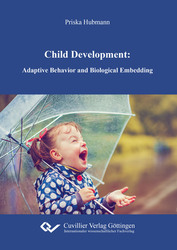| Areas | |
|---|---|
| Serie de libros (97) |
1381
|
| Nachhaltigkeit |
3
|
| Gesundheitswesen |
1
|
| Letra |
2369
|
| Medienwissenschaften | 16 |
| Teología | 57 |
| Filosofía | 102 |
| Derecho | 423 |
| Economía | 851 |
| Ciencias sociales | 417 |
| Ciencias del deporte | 48 |
| Psicología | 233 |
| Educación | 190 |
| Historia | 183 |
| Arte | 111 |
| Ciencias culturales | 166 |
| Literatur | 117 |
| Lingüística | 88 |
| Ciencias Naturales |
5408
|
| Ciencias Ingeniería |
1795
|
| General |
98
|
|
Leitlinien Unfallchirurgie
5. Auflage bestellen |
|
Erweiterte Suche
Child Development (Tienda española)
Adaptive Behavior and Biological Embedding
Priska Hubmann (Autor)Previo
Indice, PDF (50 KB)
Lectura de prueba, PDF (73 KB)
Childhood seems to represent an important timeline of vulnerability. Previous research indicates that first symptoms of many adult psychopathologies such as depression, anxiety, antisocial personality disorders, etc. can already be observed in early childhood. Therefore, it is crucial to understand the dynamics that lead to maladaptive development, known to pose various challenges on individuals, families, and society. Biological embedding is seen as one underlying mechanism. In this process, early childhood adversities are assumed to result in enduring changes in systems responsible for the physiological stability of an organism, which then may have detrimental consequences for the physical and mental health.
The aim of the present thesis was to provide a different perspective on adaptive child development, and how it is influenced by various risk and protective factors. Moreover, it aims to contribute to a better understanding of underlying biological mechanisms, investigating the associations between stress-related biological parameters and risk and protective factors in early childhood.
| ISBN-13 (Impresion) | 9783736995055 |
| ISBN-13 (E-Book) | 9783736985056 |
| Formato | A5 |
| Idioma | Inglés |
| Numero de paginas | 150 |
| Laminacion de la cubierta | mate |
| Edicion | 1. Aufl. |
| Lugar de publicacion | Göttingen |
| Lugar de la disertacion | Zürich |
| Fecha de publicacion | 04.04.2017 |
| Clasificacion simple | Tesis doctoral |
| Area |
Psicología
|
| Palabras claves | child development, FKBP5, methylation, nail cortisol concentration, early intervention, adaptive behavior, parental sensitivity,child internalizing and externalizing behavior |








